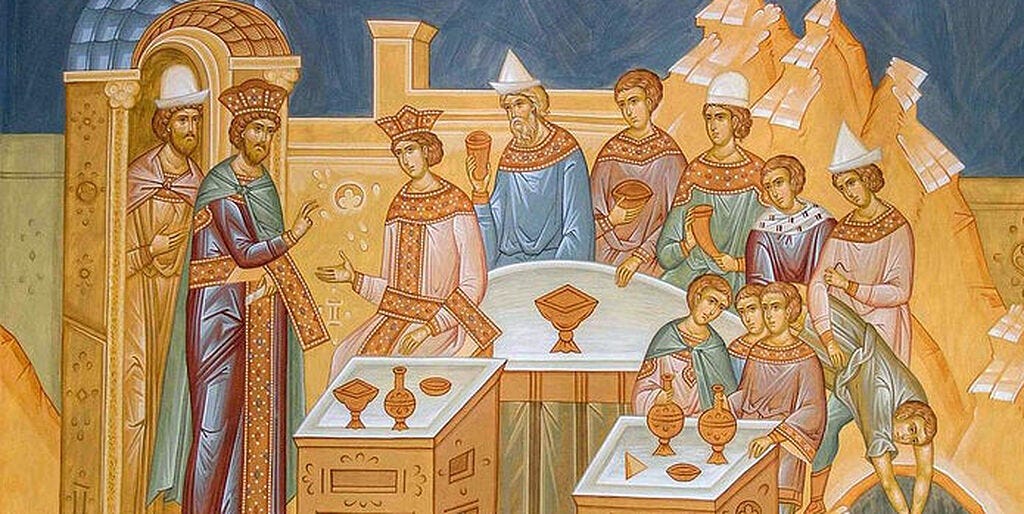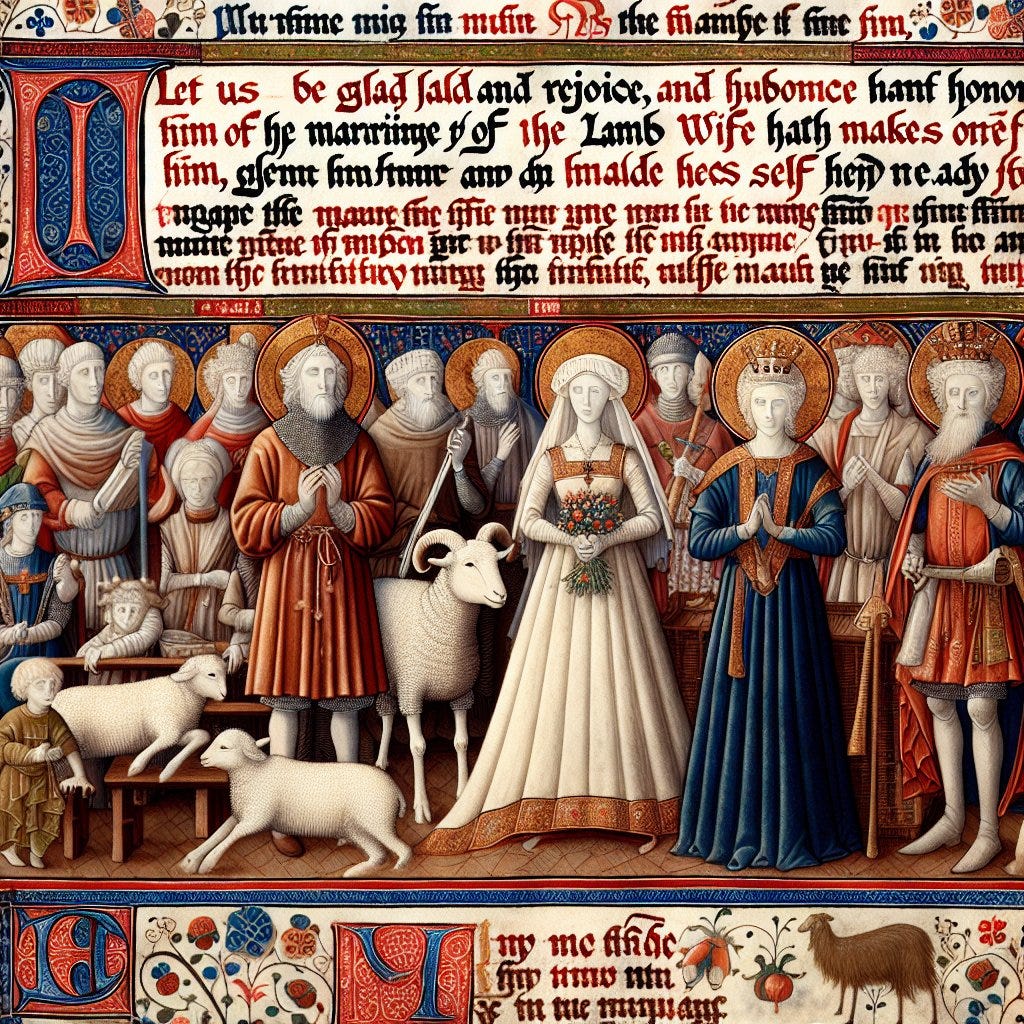The Parable of the Wedding Banquet :: Matthew 22:1-14
sermon reflection for August 24, 2025
Reader, I’ll be honest. I had trouble with this one. I don’t care for the tendency that Matthew has to project violence onto g-d. The whole theodicy thing wigs me out. I’m not a fan of the angry g-d theology. It’s not how my mother raised me, in our devoutly Catholic world.
So, I had to let this one percolate for a few days. And when I read Brad Jersak and colleagues unpack this parable, it made more sense and I realised I’m probably supposed to feel uncomfortable with this vision of g-d.
Let’s begin with the passage.
Matthew 22:1-14 :: The Parable of the Wedding Banquet
22 Jesus spoke to them again in parables, saying:2 “The kingdom of heaven is like a king who prepared a wedding banquet for his son. 3 He sent his servants to those who had been invited to the banquet to tell them to come, but they refused to come.
4 “Then he sent some more servants and said, ‘Tell those who have been invited that I have prepared my dinner: My oxen and fattened cattle have been butchered, and everything is ready. Come to the wedding banquet.’
5 “But they paid no attention and went off—one to his field, another to his business. 6 The rest seized his servants, mistreated them and killed them.7 The king was enraged. He sent his army and destroyed those murderers and burned their city.
8 “Then he said to his servants, ‘The wedding banquet is ready, but those I invited did not deserve to come. 9 So go to the street corners and invite to the banquet anyone you find.’ 10 So the servants went out into the streets and gathered all the people they could find, the bad as well as the good,and the wedding hall was filled with guests.
11 “But when the king came in to see the guests, he noticed a man there who was not wearing wedding clothes. 12 He asked, ‘How did you get in here without wedding clothes, friend?’ The man was speechless.
13 “Then the king told the attendants, ‘Tie him hand and foot, and throw him outside, into the darkness, where there will be weeping and gnashing of teeth.’
14 “For many are invited, but few are chosen.”
Next, we have the sermon. You can watch Pastor Heechan’s sermon below.
This parable tells the story of a king who’s prepared a grand wedding feast. The king invites people to his wedding feast, the invitees reject the invitation. The king sends another invitation with servants. The invitees again refuse. Some go into their fields, others seize the servants and abuse and kill them. The king grows angry, sends his army to destroy the invitees who refused his invitation and murdered his servants.
Pastor Heechan began by describing the symbolism of the parable. The king is g-d and the banquet is the messianic feast, the offer of salvation. Jesus teaches this parable in an effort to tell the religious leaders of his time that He is the messiah. The story is a foreshadowing of the fate of Jesus, who met His death by execution at the bidding of Caiphus and Herod and the Roman Emperor. The story is a foreshadow of the destruction of the temple and the exile of the Israelites. Another level of symbolism involves seeing Jesus as the bridegroom and His church as the bride.
Let me pause here for a moment.
As mentioned above, when I did some research on this parable, I came across the exegesis of Brad Jersak with colleagues Derek Flood, Brian Zahnd, and Andrew Klager. Derek Flood points out that the Gospel of Luke tells the story of this parable without violence and muses about why Matthew needs the vengeful and violent g-d.
Brad Jersak reminds us that g-d gave us Free Will, and as such, He “will give over the defiant to their self destructive choices and to the consequences or intrinsic judgements of those choices.”
Brian Zahnd pointed out that Jesus delivered this sermon during his last week in Jerusalem. So, the prophecy of the destruction of the Temple and the fall of Jerusalem fits. Andrew Klager notes that the king killed only the murderers and their cities, and he suggests that it’s an indication of “a self-inflicted equivalent response to their violence.”
Together, these ideas help me understand the thing that left me feeling uncomfortable with this parable. I feel like this resolves my conflict over the portrayal of the vengeful violent g-d. Brian Zahnd describes a phenomenon he calls tri-theism, in which Christians ascribe violent wrath to the Father, and redemption to the Son. That’s a common lens through which many Christians view g-d. I have never really bought it, reader.
So, let’s continue with Pastor Heechan’s sermon.
The detail of improper clothes at the wedding speaks to a cultural custom of the time period. Did the king provide the clothing given by the king? When the guest shows up without the given clothing he disrespects the king. Was the required clothing an accessible outfit? When the guest shows up without the required outfit, he disrespects the king. These details symbolise something deeper, something related to the kingdom of g-d.
The king rewrites the guest list because the original invitees rejected the invitation. The king expands his guest list, makes an open invitation so he can fill his feast hall. The open invitation doesn’t mean that anyone can show up on their own terms. What does the required outfit symbolise? A clean and sincere heart? A life lived in alignment with g-d? Faith backed up by godly action?
Pastor Heechan reminds us of James 2:17, “in the same way, faith by itself, if it is not accompanied by action, is dead.” Then he mentions NT scholar Grant R. Osborne, who says that repentance and righteous living go hand in hand. Pastor Heechan reminds us of John 3:16, “for g-d so loved the world He gave His only son, that whomever believes in Him shall have eternal life.” Does faith provide the impetus for repentance?
Pastor Heechan draws out three points from the passage:
The banquet has already begun
The good news about the kingdom of g-d is for everyone
We must live the kingdom reality now in order to enter the kingdom.
We aren’t alone in our struggles, g-d suffers with us. He clothes us in a garment of salvation and robe of righteousness. It’s not what we do, it’s the mercy of Jesus that saves. We need to keep the clothing clean. The Holy Spirit reminds us. Through the cross we are made new.
Isaiah 61:10 says, “I delight greatly in the Lord;
my soul rejoices in my God. For he has clothed me with garments of salvation and arrayed me in a robe of his righteousness, as a bridegroom adorns his head like a priest, and as a bride adorns herself with her jewels.”
Revelation 19:7-8 says, “for the wedding of the Lamb has come, and his bride has made herself ready.8 Fine linen, bright and clean, was given her to wear.”
Pastor Heechan ends his sermon with a few final questions, questions for our continuous self examination. Are you ready for the banquet? Have you received the clothing of g-d? Are you washing your clothes daily Do you keep your clothing clean?





Why do you use "g-d"?
Thank you for this sermon. I've never been uncomfortable with these glimpses of an angry God. It shows God's no pushover, even through Jesus, and in this world of "love is love" I need that, regardless of the real possibility it will get me too, in the end.
The fact that there is actually no longer anything I can do to help save my children if they do not believe, causes me grief.